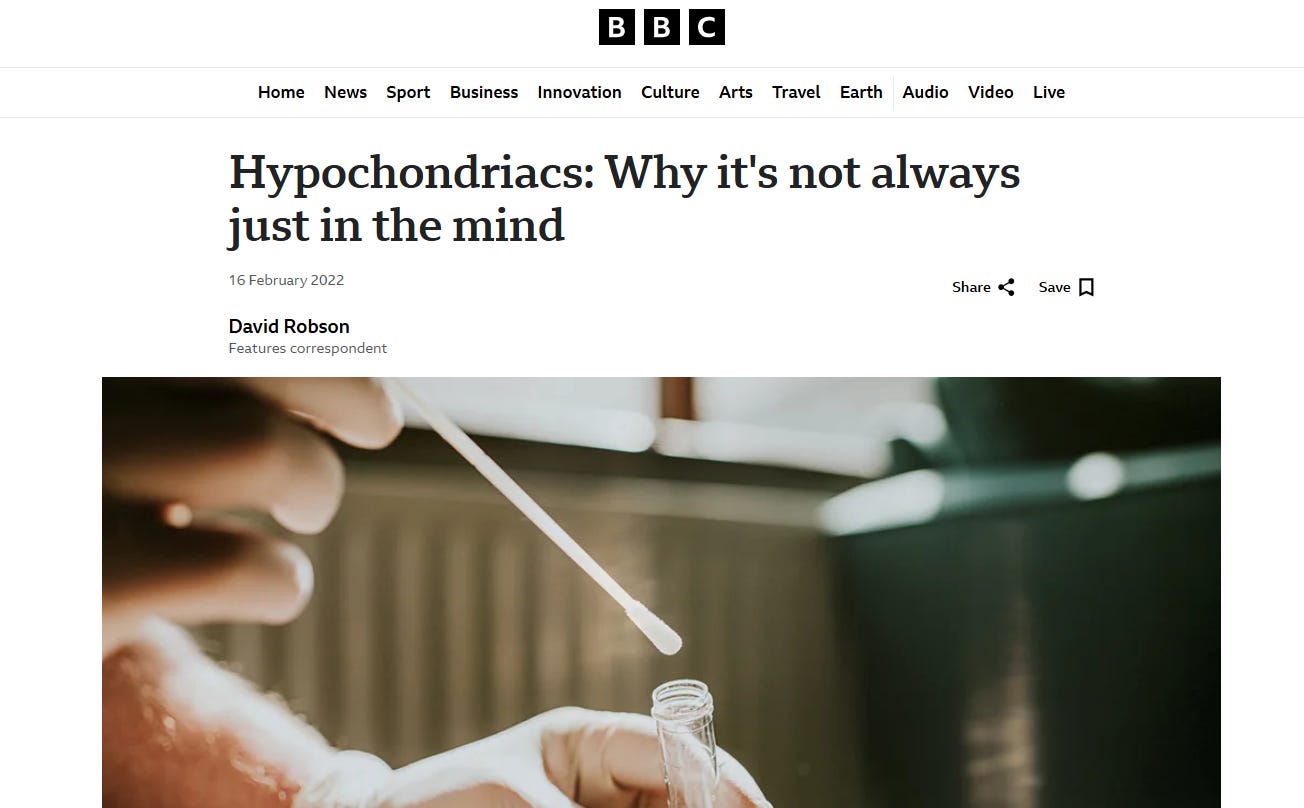More on the nocebo effect...
So much is known about it, but nobody is willing to join the dots.
Regular readers will know that I have a particular interest in “the nocebo effect”, believing it to be an important constituent element making up the illusion of spreading disease.
Basically, I believe that social contagion (augmented by propaganda, especially when super-charged by the internet) can account for the spread of symptoms, which can be perceived as “real” illness.
My articles on the topic can be found here; this one is probably the most useful one to start with:
In this article I am just citing a few further interesting other articles I have recently come across on this topic.
Firstly, I found a link to the below piece, published just a few days ago, via this post by Sanjeev Sabhlok on his Telegram channel:
This article focuses on the proposition that the nocebo effect might be responsible for the side effects of certain medications, including, of course, the products known as covid vaccines.
Now, though this might be regarded by some as a form of gaslighting, as it so happens I myself DO believe that this effect might be a contributory factor as regards covid vaccine harms, but to what extent it is difficult to say. It certainly won’t be the whole story, and it might only be a small part of it.
But the most notable thing about the article is that - having attempted to use the idea of the nocebo effect to wash away or minimise the harms from the covid vaccines - it does not mention the fact that the exact same mechanisms it cites would certainly have been at play as a result of the relentless negative government propaganda and insane testing apparatus used to support the lie that a novel dangerous pathogen was spreading around the world.
Secondly, via this substack article by Chris Waldburger, I found this link to a 2015 piece on the BBC website (click on picture below):
This is actually a good piece, overlapping with much of the ground I have covered in my articles.
Via a bit of searching, I came across this 2022 piece by the same author, David Robson:
In this article, he even mentions “covid” - within the context of having made “health anxiety” worse.
Here are some notable extracts from the article - which is worth reading in full:
For some people, the act of just testing whether they have an illness can make them feel worse. Covid may have made it worse.
The episode was my first – and so far, my only – experience of illness (or health) anxiety. According to the latest research, at least 6% of people will experience the condition during their lifetime.
Although we don't yet have updated statistics, that number may have increased rapidly over the pandemic. With a continuous news cycle emphasising the symptoms and dangers of the virus, it is natural to feel a certain level of preoccupation about a possible infection. But for some people the fear of the virus will have been all-consuming, peaking as they await the results of a lateral flow or PCR test.
The pandemic could have also exacerbated anxieties about other conditions. "I suspect that health anxiety has increased quite considerably during the pandemic, not least because people have had more time to ruminate and reflect on their symptoms," says Peter Tyrer, a professor in community psychiatry at Imperial College London.
In many situations, anxieties about our health can create the appearance of symptoms – a self-fulfilling prophecy that might seem to confirm our fears.
But there are many other ways our fears can create the appearance of illness. Our expectations can shape our attention and sensory processing, for example. If you suspect you may have been infected by Covid-19, for example, you may be extra conscious of a tickle in your throat, an ache in your chest or a feeling of breathlessness – and the more you think about it, the worse it will seem. This may be especially likely if someone close to you has had the disease, so you know exactly what symptoms to expect – and a negative LFT or PCR test may not be enough to assuage your fears.
Our expectations can even bring about physiological change, such as the release of vasodilating molecules that cause headaches. Scientists call these reactions "nocebo effects" (a direct contrast to the beneficial "placebo effects"). And the discomfort can be just as unpleasant as a symptom with a purely biological cause. This will only increase the anxiety – setting about a vicious cycle.
However, the author doesn’t seem to be able to link this to the effects of propaganda combined with internet-augmented spread of social contagion.
Or if he has, he isn’t saying.






Thank you for still writing on this very important topic. In David R. Hamilton PhD's book The Contagious Power of Thinking is an interesting chapter on Contagious Fear. The whole book is excellent, but that particular chapter is very relevant to recent times. Worth reading if you haven't already.
A fictional disease that is defined by a complex of symptoms that are common and virtually indistinguishable from those of common upper respiratory disorders is especially liable to be heavily influenced by the nocebo effect. Add to that the complete unreliability of the so-called "tests" and one can be sure that all the statistics quoted are useless.